Meet the New Duke Divinity School Faculty
A dynamic cohort strengthens our community with their interdisciplinary experience and theological expertise
An occupational therapist, an organist, and a food economist walk into a divinity school—it might sound like the beginning of a funny story, but they are actually three of the eight exciting new hires who have joined the Duke Divinity faculty in 2020.
The new faculty include Peter Casarella, Janet Martin Soskice, Norbert Wilson, Wylin Wilson, Quinton Dixie, Sarah Jean Barton, Zebulon Highben, and Alma Tinoco Ruiz. They will add to the school’s existing strengths in theology, ethics, church history, homiletics, evangelism, and Black Church studies, as well as bring expertise through their scholarship in public policy and food, music and worship, disability care, and Hispanic preaching. They will also add strength to major initiatives such as Theology, Medicine, and Culture and the Black Pastoral Leadership Collaboration.
“We are delighted to welcome these eight new faculty colleagues to Duke Divinity School,” said Dean L. Gregory Jones, the Ruth W. and A. Morris Williams Jr. Distinguished Professor of Theology and Christian Ministry. “Collectively, they significantly expand and enrich our teaching, learning, and scholarship. Each of them brings distinctive gifts to our community, and we are a much stronger school as a result of their appointments. We look forward with great anticipation and excitement to their contributions and leadership.”
Peter Casarella
Professor of Theology
Peter Casarella joins Duke from the University of Notre Dame, and he has served as director of the Latin American North American Church Concerns (LANACC) project in the Kellogg Institute for International Studies. His research focuses on systematic theology, world religions, and the world church, and he has published widely on medieval Christian Neoplatonism, contemporary theological aesthetics, intercultural thought, and the Hispanic/Latino presence in the U.S. Catholic Church.
“For me, the beauty and justice of Latinx theology intertwine when I am mesmerized by the powerful and powerfully evangelical popular devotions of the people of God even as I strive vigorously to right the wrongs that have been inflicted upon the crucified body of this very same people. Here in a pastoral act of accompaniment is where we discover the intersection of beauty and justice.
Duke Divinity is a place that does not dismiss or abandon our anchoring in the Christian past but also seeks to make the Gospel attend to the needs of the marginalized and to the living wisdom of people of color. Duke is an ideal place, in fact the best place in the country, for Latinx Catholics and Latinx Protestants to work together in a collaborative and ecumenical way. Anglo Christians will also find stimulating insights within Latinx theology about decolonial epistemology, the vulnerability of the body of Christ, and the abiding need to highlight the everyday witness of lay women.”
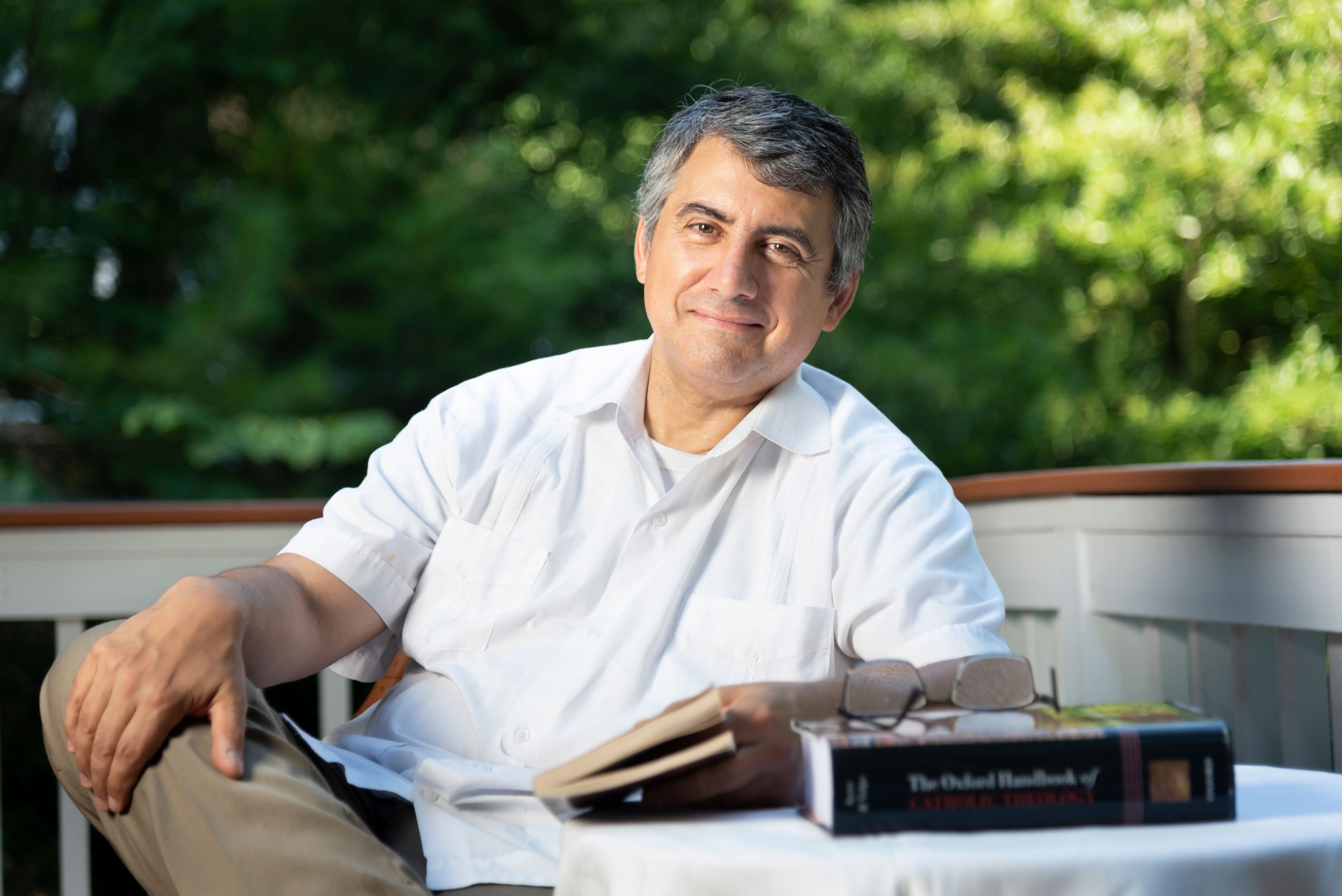
Peter Casarella
Professor of Theology
Peter Casarella joins Duke from the University of Notre Dame, and he has served as director of the Latin American North American Church Concerns (LANACC) project in the Kellogg Institute for International Studies. His research focuses on systematic theology, world religions, and the world church, and he has published widely on medieval Christian Neoplatonism, contemporary theological aesthetics, intercultural thought, and the Hispanic/Latino presence in the U.S. Catholic Church.
“For me, the beauty and justice of Latinx theology intertwine when I am mesmerized by the powerful and powerfully evangelical popular devotions of the people of God even as I strive vigorously to right the wrongs that have been inflicted upon the crucified body of this very same people. Here in a pastoral act of accompaniment is where we discover the intersection of beauty and justice.
Duke Divinity is a place that does not dismiss or abandon our anchoring in the Christian past but also seeks to make the Gospel attend to the needs of the marginalized and to the living wisdom of people of color. Duke is an ideal place, in fact the best place in the country, for Latinx Catholics and Latinx Protestants to work together in a collaborative and ecumenical way. Anglo Christians will also find stimulating insights within Latinx theology about decolonial epistemology, the vulnerability of the body of Christ, and the abiding need to highlight the everyday witness of lay women.”
 Janet Martin Soskice
Janet Martin Soskice
William K. Warren Distinguished Research Professor of Catholic Theology
Janet Soskice’s work lies at the intersection of Christian theology and philosophy, with particular interest in questions of method and the doctrine of God: religious language, metaphysics and epistemology, narrative and genre, doctrine of creation, women and religion, beauty and western art, science and religion, and theological writing. For over 30 years, she was on the Faculty of Divinity at the University of Cambridge, where she is professor emerita of philosophical theology.
Her books include Metaphor and Religious Language (Oxford); The Kindness of God (Oxford); and her present large project on “Naming God.” Her book Sisters of Sinai: How Two Lady Adventurers Discovered the Lost Gospels (Knopf) was read as Book of the Week on BBC Radio 4 and was in the “Best Book of the Year” lists of The Washington Post and The Christian Science Monitor.
Soskice is a past president of both the Catholic Theological Association of Great Britain and the Society for the Study of Theology, and has been a Eugene McCarthy Visiting Professor at the Gregorian University in Rome and president of the Cambridge University Catholic Association. She is a member of the English and Welsh Anglican/ Roman Catholic Committee and takes part in Christian/Muslim dialogue.
Norbert Wilson
Professor of Food, Economics, and Community
Norbert Wilson’s scholarly research explores food issues such as access, choice, and food waste. Before joining Duke Divinity School, he was a professor of food policy at the Friedman School of Nutrition Science and Policy at Tufts University. He also worked as an economist/policy analyst for the Organization of Economic Development and Cooperation (OECD) in Paris, France. He continues to work on food safety and quality issues in international trade and domestic food systems. He is an ordained vocational deacon in the Episcopal Church USA.
“Charity will not solve food insecurity. Farmers need to be profitable to survive. Retailers work on thin margins. Consumers face a myriad of food choices, which are shaped by our food environments, prices, our cultural context, and behaviors.
Good jobs and education, reformation of the criminal justice system, racial equity, adequate child care, and a strong social safety net help solve the food access issue. The economics of food sits in our larger economy. Thus, we need to give our religious leaders training in the social, political, and economic systems in which we function. We cannot work for or preach about justice if we do not understand the systems of injustice and see examples of justice-making that are possible.
God has called us to justice. We see examples of people of faith meeting the immediate needs of people. We are taught within faith communities and beyond to care for our resources. One thing that I hope that I can do at Duke Divinity is to enliven the imaginations of faith leaders to address the short-term call and to engage in the long-term fight for justice.”

Norbert Wilson
Professor of Food, Economics, and Community
Norbert Wilson’s scholarly research explores food issues such as access, choice, and food waste. Before joining Duke Divinity School, he was a professor of food policy at the Friedman School of Nutrition Science and Policy at Tufts University. He also worked as an economist/policy analyst for the Organization of Economic Development and Cooperation (OECD) in Paris, France. He continues to work on food safety and quality issues in international trade and domestic food systems. He is an ordained vocational deacon in the Episcopal Church USA.
“Charity will not solve food insecurity. Farmers need to be profitable to survive. Retailers work on thin margins. Consumers face a myriad of food choices, which are shaped by our food environments, prices, our cultural context, and behaviors.
Good jobs and education, reformation of the criminal justice system, racial equity, adequate child care, and a strong social safety net help solve the food access issue. The economics of food sits in our larger economy. Thus, we need to give our religious leaders training in the social, political, and economic systems in which we function. We cannot work for or preach about justice if we do not understand the systems of injustice and see examples of justice-making that are possible.
God has called us to justice. We see examples of people of faith meeting the immediate needs of people. We are taught within faith communities and beyond to care for our resources. One thing that I hope that I can do at Duke Divinity is to enliven the imaginations of faith leaders to address the short-term call and to engage in the long-term fight for justice.”
Wylin Dassie Wilson
Assistant Professor of Theological Ethics
Wylin Wilson’s research lies at the intersection of religion, gender, and bioethics, including rural bioethics and Black Church studies. Prior to joining Duke Divinity School, she was a teaching faculty member at the Harvard Medical School Center for Bioethics and a senior fellow at the Center for the Study of World Religions at Harvard Divinity School.
She has also served as visiting lecturer and research associate at the Harvard Divinity School Women’s Studies in Religion Program, associate director of education at the Tuskegee University National Center for Bioethics in Research and Health Care, and faculty member in the College of Agriculture, Environment, and Nutrition Sciences at Tuskegee University. Among her publications is her book, Economic Ethics and the Black Church.
Wilson served on Mount Auburn Hospital Ethics Committee in Cambridge, Mass., advisory board member for the Rural Child Hunger Summit, and volunteer spiritual caregiver for Somerville-Cambridge Elder Services in Somerville, Mass. She is a member of the American Academy of Religion’s Bioethics and Religion Program Unit Steering Committee.
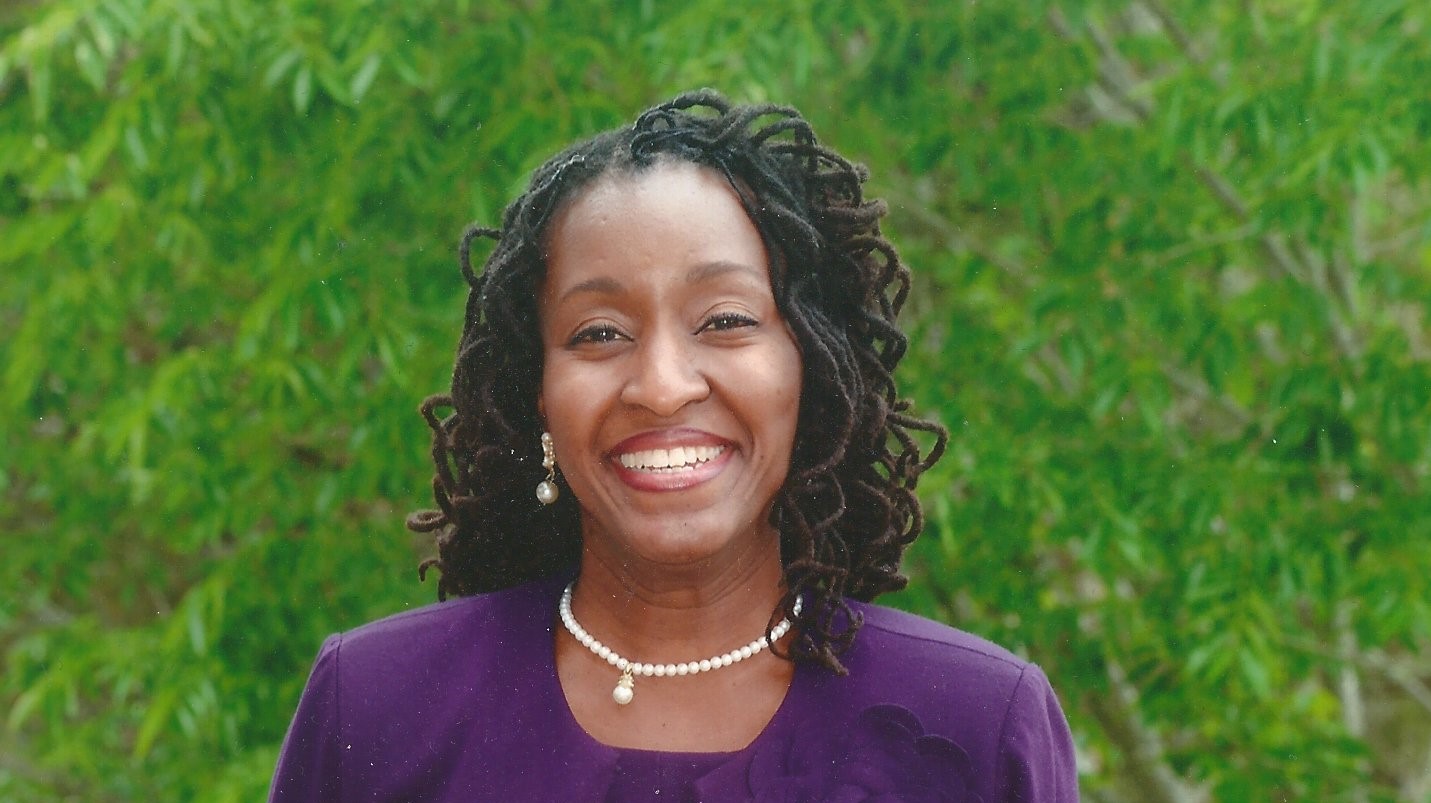
Wylin Dassie Wilson
Assistant Professor of Theological Ethics
Wylin Wilson’s research lies at the intersection of religion, gender, and bioethics, including rural bioethics and Black Church studies. Prior to joining Duke Divinity School, she was a teaching faculty member at the Harvard Medical School Center for Bioethics and a senior fellow at the Center for the Study of World Religions at Harvard Divinity School.
She has also served as visiting lecturer and research associate at the Harvard Divinity School Women’s Studies in Religion Program, associate director of education at the Tuskegee University National Center for Bioethics in Research and Health Care, and faculty member in the College of Agriculture, Environment, and Nutrition Sciences at Tuskegee University. Among her publications is her book, Economic Ethics and the Black Church.
Wilson served on Mount Auburn Hospital Ethics Committee in Cambridge, Mass., advisory board member for the Rural Child Hunger Summit, and volunteer spiritual caregiver for Somerville-Cambridge Elder Services in Somerville, Mass. She is a member of the American Academy of Religion’s Bioethics and Religion Program Unit Steering Committee.
Quinton Dixie
Associate Research Professor of Church History and Black Church Studies
Quinton Dixie specializes in American religious history and has written on a wide range of topics, from the African American Civil Rights Movement to the history of Black Baptists in the U.S. His interest in documentary editing led to work on two projects with James M. Washington: I Have a Dream, a collection of Martin Luther King Jr.’s writings and speeches for young adult readers; and Conversations with God, an edited volume of African American prayers ranging from early America to the close of the 20th century. He received a certificate from the Institute for the Editing of Historical Documents, and served 15 years on the editorial team of the Howard Thurman Papers Project.
“I think one of the important lessons from the African American religious experience for young ministers is about the endurance of suffering. To paraphrase Howard Thurman, the test of a person’s character is how much suffering he or she can endure without losing hope. Students about to go forth and minister to people in hopeless situations can learn a great deal about what historian Albert Raboteau calls the ‘sorrowful joy’ and ‘joyful sorrow’ that is the story of African American faith.
Joining Duke Divinity School affords me the opportunity to serve the church while being a part of a first-rate academic institution. It seemed to me to be the best of both worlds.”
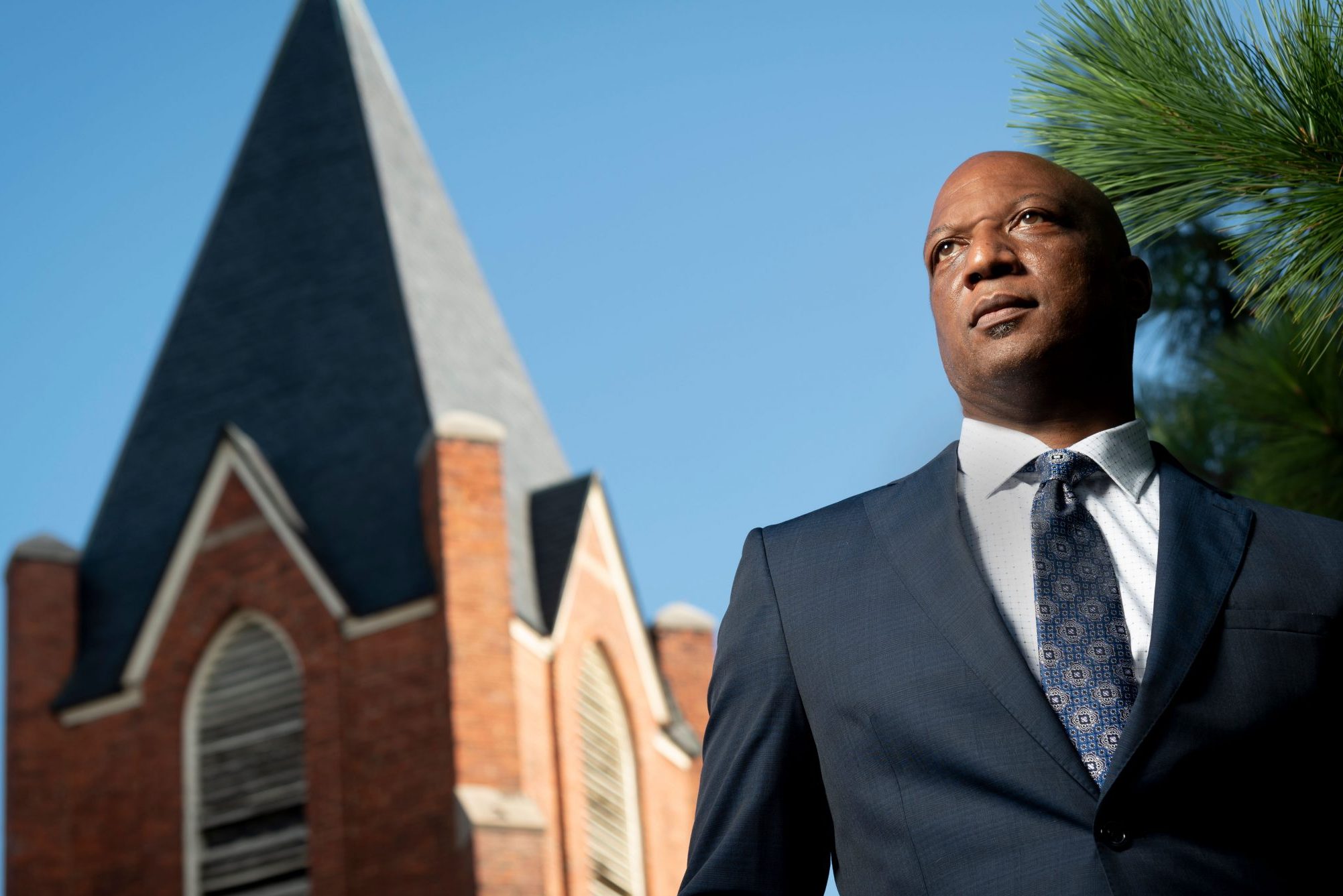
Quinton Dixie
Associate Research Professor of Church History and Black Church Studies
Quinton Dixie specializes in American religious history and has written on a wide range of topics, from the African American Civil Rights Movement to the history of Black Baptists in the U.S. His interest in documentary editing led to work on two projects with James M. Washington: I Have a Dream, a collection of Martin Luther King Jr.’s writings and speeches for young adult readers; and Conversations with God, an edited volume of African American prayers ranging from early America to the close of the 20th century. He received a certificate from the Institute for the Editing of Historical Documents, and served 15 years on the editorial team of the Howard Thurman Papers Project.
“I think one of the important lessons from the African American religious experience for young ministers is about the endurance of suffering. To paraphrase Howard Thurman, the test of a person’s character is how much suffering he or she can endure without losing hope. Students about to go forth and minister to people in hopeless situations can learn a great deal about what historian Albert Raboteau calls the ‘sorrowful joy’ and ‘joyful sorrow’ that is the story of African American faith.
Joining Duke Divinity School affords me the opportunity to serve the church while being a part of a first-rate academic institution. It seemed to me to be the best of both worlds.”
Sarah Jean Barton
Assistant Professor of Occupational Therapy and Theological Ethics
Sarah Barton’s scholarly work is focused in theological ethics, with special attention to theological anthropology, disability, liturgy, and pastoral care. She has a joint faculty appointment as assistant professor of occupational therapy at Duke University Medical Center in the Department of Orthopaedic Surgery and is a practicing occupational therapist with a current board certification in pediatrics.
“Individuals and communities who experience disability bring a wealth of pressing questions for those of us in the areas of Christian theology and ethics. For example, painful conversations about experiences of church exclusion are extremely common among families I work with as an occupational therapist. Hearing parents lament that their children with disabilities were denied baptism fueled the research for my dissertation, as well as an ecumenical formational resource for lay people I am currently writing. These experiences call forth a response from Christian theologians and ethicists – how can we more faithfully practice repentance and hospitality? How do our theologies and practices of discipleship support the baptismal vocation of all Christians? How can we think more expansively about liturgy and worship in a way that creatively and robustly involves disabled people?
It is my hope that in the aftermath of this pandemic, we see a renewed and intentional commitment to inclusive structures (including virtual platforms) that allow people with a wide variety of access needs to robustly participate in the activities and communities that support their wellbeing, livelihood, and flourishing. Christian churches can and should witness to this creative work of universal access.”
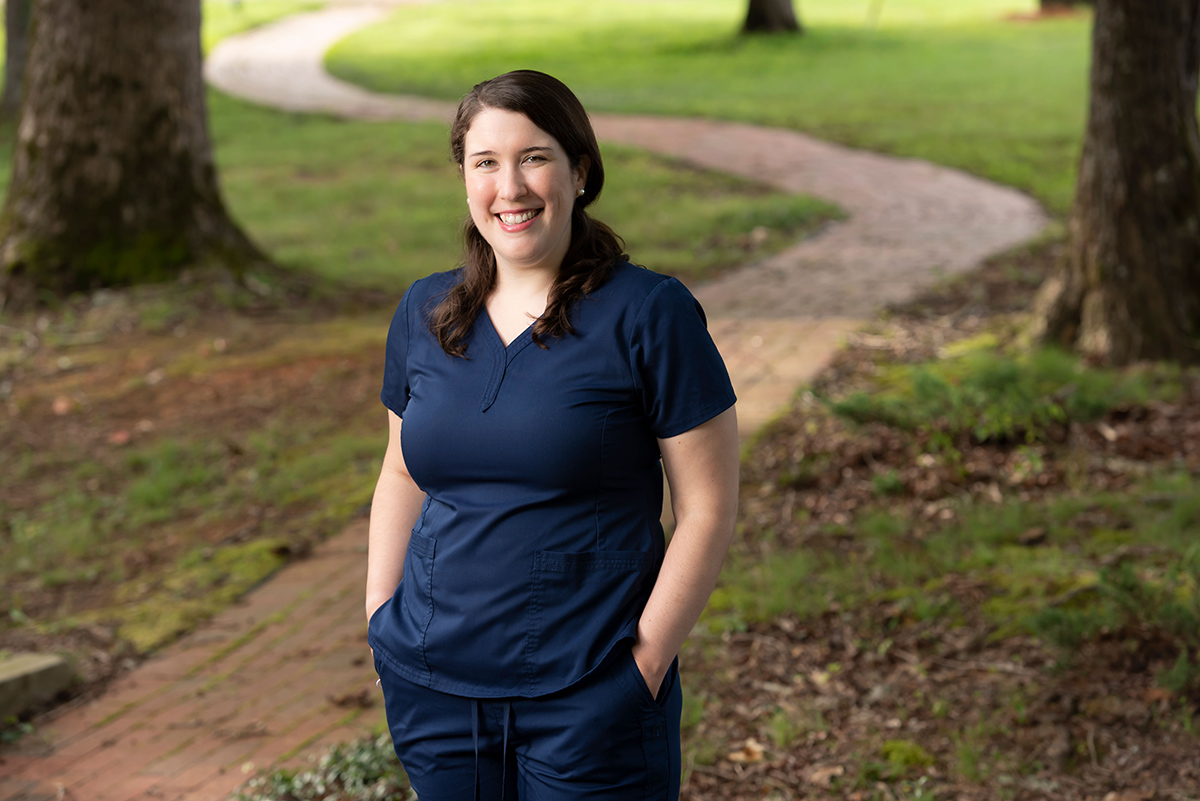
Sarah Jean Barton
Assistant Professor of Occupational Therapy and Theological Ethics
Sarah Barton’s scholarly work is focused in theological ethics, with special attention to theological anthropology, disability, liturgy, and pastoral care. She has a joint faculty appointment as assistant professor of occupational therapy at Duke University Medical Center in the Department of Orthopaedic Surgery and is a practicing occupational therapist with a current board certification in pediatrics.
“Individuals and communities who experience disability bring a wealth of pressing questions for those of us in the areas of Christian theology and ethics. For example, painful conversations about experiences of church exclusion are extremely common among families I work with as an occupational therapist. Hearing parents lament that their children with disabilities were denied baptism fueled the research for my dissertation, as well as an ecumenical formational resource for lay people I am currently writing. These experiences call forth a response from Christian theologians and ethicists – how can we more faithfully practice repentance and hospitality? How do our theologies and practices of discipleship support the baptismal vocation of all Christians? How can we think more expansively about liturgy and worship in a way that creatively and robustly involves disabled people?
It is my hope that in the aftermath of this pandemic, we see a renewed and intentional commitment to inclusive structures (including virtual platforms) that allow people with a wide variety of access needs to robustly participate in the activities and communities that support their wellbeing, livelihood, and flourishing. Christian churches can and should witness to this creative work of universal access.”
Zebulon M. Highben
Associate Professor of the Practice of Church Music at Duke Divinity School and Director of Chapel Music at Duke University Chapel
Zebulon Highben’s research interests include hymnody, liturgy, music and exegesis, the musical heritage of the Reformation, and the impact of the Second World War on German sacred music. His published scholarship includes numerous articles and essays, two choral anthologies, and more than 50 choral and liturgical compositions published in the U.S. and Sweden. He has received conducting and/or composition awards from The American Prize, the American Choral Directors Association, the American Composers Forum, the Association of Lutheran Church Musicians, and the American Society of Composers, Authors and Publishers. He has served as a church musician for Lutheran, Presbyterian, and Methodist congregations, and he is an ordained deacon in the Evangelical Luther Church in America.
“Church music is a multi-layered discipline that draws upon theology, biblical studies, church history, and homiletics, in addition to many musical and rhetorical disciplines. Music is a fundamental aspect of worship in almost every Christian tradition, and Scripture itself is filled with mandates to sing and examples of corporate music-making. Music can enhance—or detract from!—the ritual practices of worship. The songs we sing together also play a profound role in faith formation: What we sing shapes what we believe. That formation isn’t just about the words; two contrasting melodies can emphasize different aspects of the same lyrics, and create different holistic experiences for the worshiper.
Lately, I’ve turned toward writing hymns over other types of sacred music. Sometimes I am writing both text and music; other times I collaborate with a poet or hymn writer and I compose the tune. Some of these projects have been connected to aspects of the pandemic, or the issues of inequity, racism, and justice we are confronting nationally.
A previous composition that has been in my mind lately is an Advent choral anthem, The Lord Shall Come and Not Be Slow. I wrote it in November 2008, which was a difficult time for my family, and in the midst of a major economic recession. I drew on some of the same biblical texts then that I find myself returning to now. I think that’s why it has been on my mind.
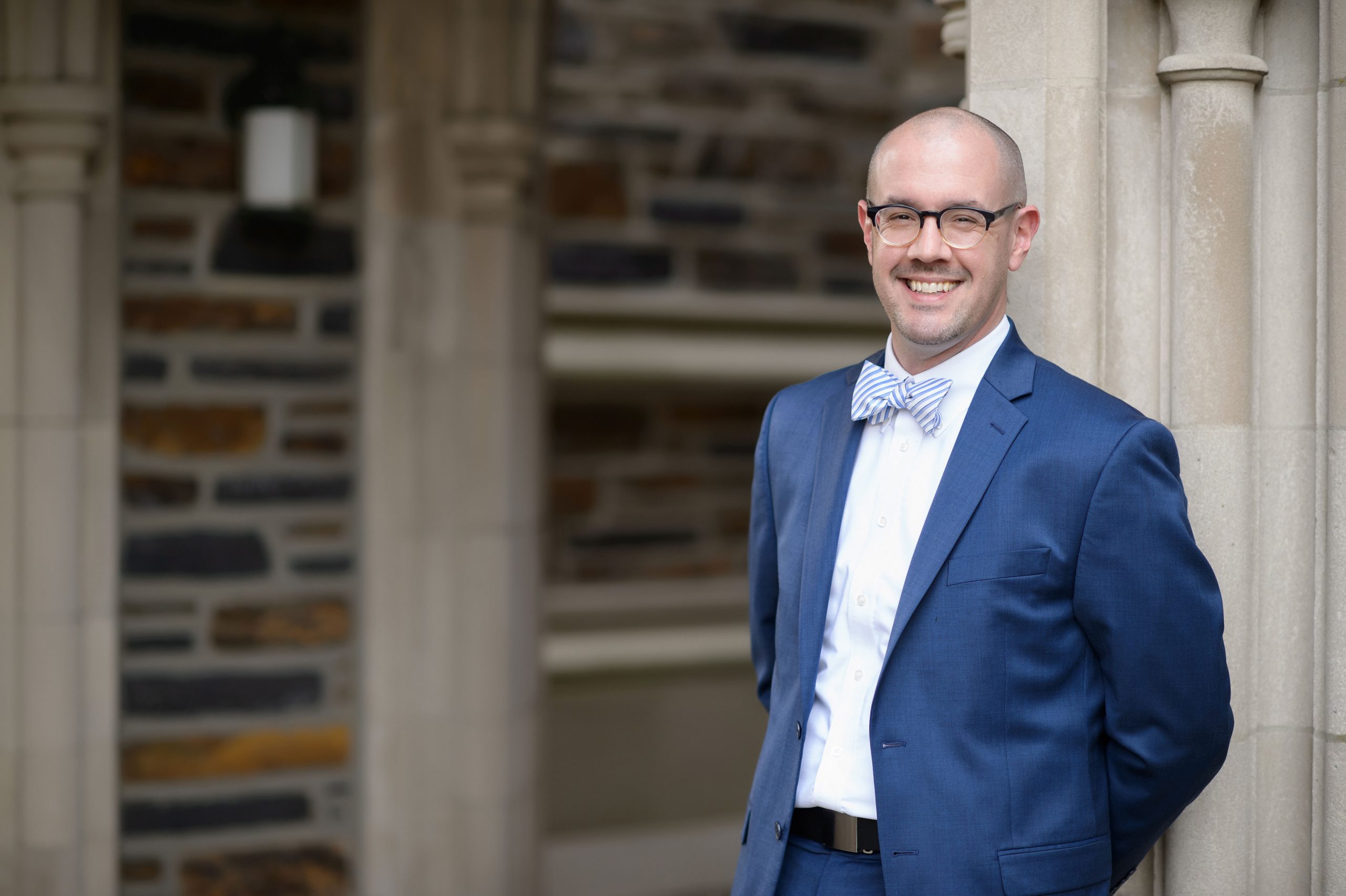
Zebulon M. Highben
Associate Professor of the Practice of Church Music at Duke Divinity School and Director of Chapel Music at Duke University Chapel
Zebulon Highben’s research interests include hymnody, liturgy, music and exegesis, the musical heritage of the Reformation, and the impact of the Second World War on German sacred music. His published scholarship includes numerous articles and essays, two choral anthologies, and more than 50 choral and liturgical compositions published in the U.S. and Sweden. He has received conducting and/or composition awards from The American Prize, the American Choral Directors Association, the American Composers Forum, the Association of Lutheran Church Musicians, and the American Society of Composers, Authors and Publishers. He has served as a church musician for Lutheran, Presbyterian, and Methodist congregations, and he is an ordained deacon in the Evangelical Luther Church in America.
“Church music is a multi-layered discipline that draws upon theology, biblical studies, church history, and homiletics, in addition to many musical and rhetorical disciplines. Music is a fundamental aspect of worship in almost every Christian tradition, and Scripture itself is filled with mandates to sing and examples of corporate music-making. Music can enhance—or detract from!—the ritual practices of worship. The songs we sing together also play a profound role in faith formation: What we sing shapes what we believe. That formation isn’t just about the words; two contrasting melodies can emphasize different aspects of the same lyrics, and create different holistic experiences for the worshiper.
Lately, I’ve turned toward writing hymns over other types of sacred music. Sometimes I am writing both text and music; other times I collaborate with a poet or hymn writer and I compose the tune. Some of these projects have been connected to aspects of the pandemic, or the issues of inequity, racism, and justice we are confronting nationally.
A previous composition that has been in my mind lately is an Advent choral anthem, The Lord Shall Come and Not Be Slow. I wrote it in November 2008, which was a difficult time for my family, and in the midst of a major economic recession. I drew on some of the same biblical texts then that I find myself returning to now. I think that’s why it has been on my mind.
Alma Tinoco Ruiz
Lecturer in Homiletics and Evangelism and Director of the Hispanic House of Studies
Alma Tinoco Ruiz focuses her research on the sermons of Saint Óscar Romero as a profound response to the traumatic injuries the marginalized and oppressed people of El Salvador and how preachers today can effectively address trauma experienced by marginalized and oppressed communities, particularly the community of undocumented immigrants from Latin America in the United States. She was named a Denman Fellow of the Foundation for Evangelism, and was awarded a Lilly Endowment Inc. fellowship for Hispanic-Latino/a students, the Forum for Theological Exploration Doctoral Fellowship, and the Hispanic Theological Initiative (HTI)/Lilly fellowship. She is a provisional elder in the United Methodist Church.
“Most people who have or are experiencing collective trauma are hungry for sermons that name, acknowledge, and validate their painful reality and help them encounter God in Scripture and in their concrete circumstances. By doing this, preachers, through their sermons, can facilitate communal lament, proclaim a message of hope in the midst of suffering, help members of the community reclaim their agency, and, consequently, help them build resilience.
I believe most pastors who serve in Hispanic/Latinx communities are hungry for people, especially those in power, to recognize and value how much Hispanic-Latinx people, regardless of their immigration status, contribute to the church and society at large in this country.
Being in ministry with the Hispanic-Latinx community, especially undocumented immigrants, in North Carolina has been a real blessing to me. I have witnessed their generosity as they share freely their God-given gifts with the church and their communities. I have witnessed their unbreakable faith as they face so many challenges in their daily living. And, most importantly, I have witnessed God’s presence among them and through them. They have taught me so much about God, Scripture, and what it means to live out our faith.”
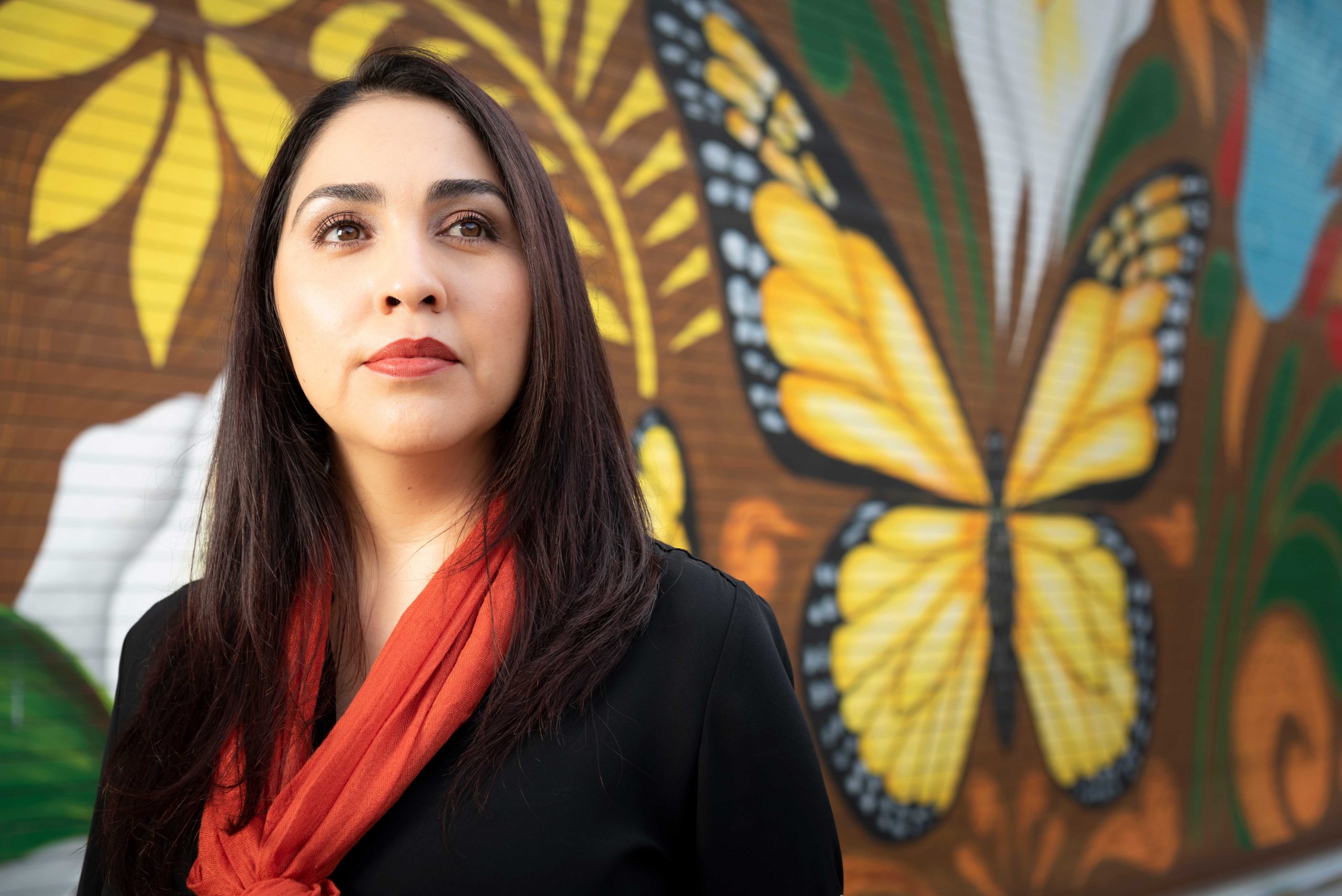
Alma Tinoco Ruiz
Lecturer in Homiletics and Evangelism and Director of the Hispanic House of Studies
Alma Tinoco Ruiz focuses her research on the sermons of Saint Óscar Romero as a profound response to the traumatic injuries the marginalized and oppressed people of El Salvador and how preachers today can effectively address trauma experienced by marginalized and oppressed communities, particularly the community of undocumented immigrants from Latin America in the United States. She was named a Denman Fellow of the Foundation for Evangelism, and was awarded a Lilly Endowment Inc. fellowship for Hispanic-Latino/a students, the Forum for Theological Exploration Doctoral Fellowship, and the Hispanic Theological Initiative (HTI)/Lilly fellowship. She is a provisional elder in the United Methodist Church.
“Most people who have or are experiencing collective trauma are hungry for sermons that name, acknowledge, and validate their painful reality and help them encounter God in Scripture and in their concrete circumstances. By doing this, preachers, through their sermons, can facilitate communal lament, proclaim a message of hope in the midst of suffering, help members of the community reclaim their agency, and, consequently, help them build resilience.
I believe most pastors who serve in Hispanic/Latinx communities are hungry for people, especially those in power, to recognize and value how much Hispanic-Latinx people, regardless of their immigration status, contribute to the church and society at large in this country.
Being in ministry with the Hispanic-Latinx community, especially undocumented immigrants, in North Carolina has been a real blessing to me. I have witnessed their generosity as they share freely their God-given gifts with the church and their communities. I have witnessed their unbreakable faith as they face so many challenges in their daily living. And, most importantly, I have witnessed God’s presence among them and through them. They have taught me so much about God, Scripture, and what it means to live out our faith.”
Sign up for the Duke Divinity School newsletter and stay up-to-date with stories about our faculty and community and news about our programs, events, and resources.